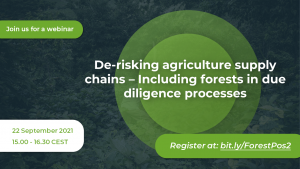الملاحظات التقييمية الرسمية على الحوارات إلى قمة الأمم المتحدة للنظم الغذائية لعام 2021
نوع الحوار
بدعوة من
لغة فعالية الحوار
التاريخ/الوقت
إلى:
نطاق التركيز الجغرافي
التنسيق
يُرجى مراجعة التفاصيل أدناه للحصول على معلومات التسجيل إذا كانت متوفرة أو الاتصال بمنظم الحوار إذا كنت ترغب في الحضور.
الوصف
The Food and Agriculture Organization of the United Nations (FAO) and the Ministry of Agriculture, Forestry and Fisheries of Japan (MAFF) are pleased to invite you to the webinar “De-risking agriculture supply chains – Including forests in due diligence processes.” This session will be the second of three online events to be held in September and October under the common topic of “Halting deforestation: approaches and tools for forest-positive commodity value chains.”
Session 2: De-risking agriculture supply chains – Including forests in due diligence processes
Date: 22 September 2021
Time: 15:00-16:30 (Rome), 22:00 (Tokyo), 9:00 (Santiago)
Language: English, French, Spanish
Registration: https://bit.ly/ForestPos2
Session objectives:
- Provide an overview of existing guidance for private sector due diligence in agriculture and emerging legislative requirements in consumer countries to ensure responsible business conduct/due diligence in agricultural supply chains as they relate to forests and climate change;
- Share experiences and lessons learned from producer countries’ experiences improving due diligence and traceability in the agriculture and forestry sectors;
- Identify needs for technical support to actors in producer countries to effectively respond to emerging measures and strategically attract responsible investment.
More information: http://www.fao.org/redd/news/detail/en/c/1436982/
ABOUT THE SEMINAR SERIES:
In tropical countries, land-use conversion to agriculture and pastureland accounts for approximately 73% of deforestation. 40% of this deforestation is attributable to pressures related to the demand for and production of commercial agricultural commodities such as beef, soy, palm oil, cocoa, timber, paper/pulp and coffee. In some of the most active fronts of deforestation, land use changes coincide with the expansion of these internationally traded commodities.
Over the past two decades, attention to the impact of demand for these ‘forest risk’ commodities in driving forest loss has increased both in consumer and producer countries. Many consumer countries have begun to identify actions to mitigate the negative consequences of their consumption of these commodities through global initiatives such as environmental standards, import regulations, due diligence processes, and continuous awareness-raising. Producer countries – boosted by more than ten years of REDD+ and, more recently, by the Paris Agreement – recognize the pressing need to address agricultural production practices to reduce deforestation and carbon emissions while pursuing social inclusion and benefit-sharing.
Corrective actions to address the impact of global commodity production and trade on forests and climate change have been taken by leading private sector actors since the early 2000s. The discourse is now evolving from deforestation-free supply chains to forest positive strategies, de-risking supply chains through certification and due-diligence processes and highlighting the opportunities of sustainable supply chains and climate finance investments.
As they are responsible for up to one-third of global GHG emissions, global food systems also offer emerging opportunities to act as prominent climate mitigation action, and may boost synergies between forest positive agriculture, climate ambitions, and forest conservation.
الشكر والتقدير


